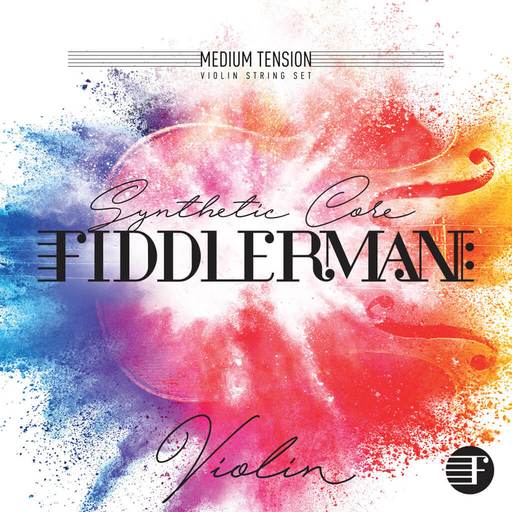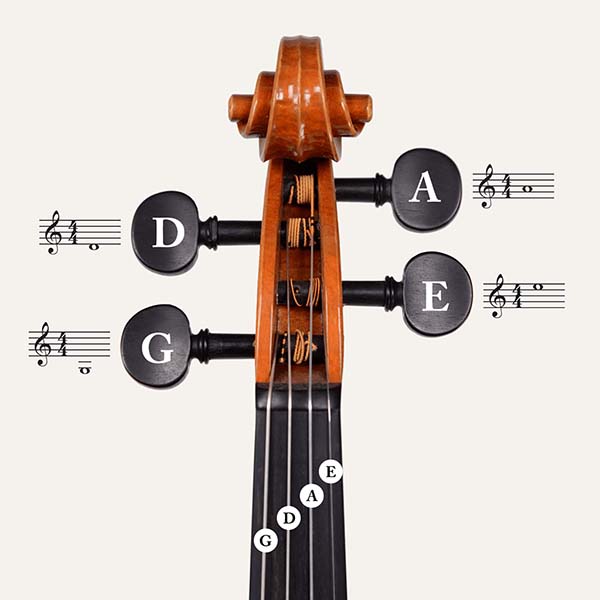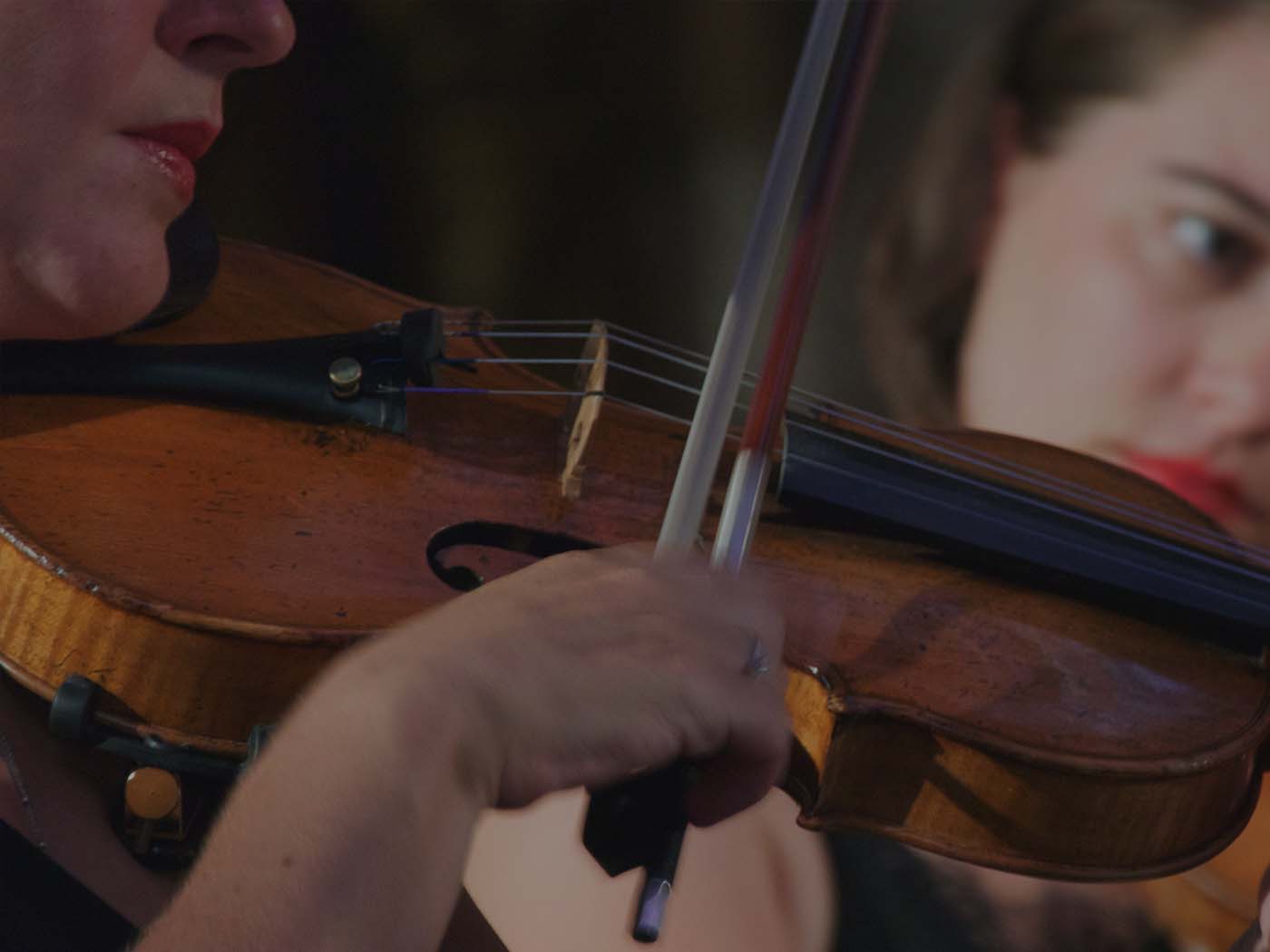Rebecca Richardson & Audrey Kaluzny, Adult Violin Learners
Believing in Ourselves and Others
By Jasmine Reese - It was the first time she held a violin; she blossomed.
Audrey Kaluzny, a vibrant 27-year-old, began playing the violin in the summer of 2017. Her step-mother, Rebecca Richardson, restarted about two years ago after a couple of short stints playing the violin as a child.
"This is the picture - [to the right] - I snapped the day she was watching me practice with such longing in her eyes, " Rebecca said. "I handed her the violin, and she immediately put it into position beautifully.... The look on her face convinced me to take her longing for lessons seriously."
Audrey has Down Syndrome. She lives in a supportive living community in her own apartment with another adult with a developmental disability. While staff is on site to make sure everyone remains safe, Audrey is independent, doing laundry, cooking, and cleaning. Of course, we now add lots of violin practice to her to-do-list. Audrey loves the violin; practices everyday without prompting from others.
Rebecca wanted to do this Music is for Everyone interview to shine a light on a key issue. We tend to make our own assumptions on what people can and can't do, instead of paying attention to their hearts. We determine ability based on age, gender, race, disabilities and so on without ever seeing past the exterior.
Thankfully, Rebecca followed through on Audrey's desire to play the violin. She hopes one day more parents, musicians, schools, and other facilities will provide the opportunity to learn art and music to people with developmental disabilities.
Let's read more about Audrey and Rebecca below.

When did you both start learning to play the violin?
I started playing as a Suzuki preschooler, but had to quit when my teacher moved. I started again in elementary school, but quit again due to frustration stemming from poor practice habits. I re-started about two years ago.
My daughter started [to play the] violin in June 2017 after she showed a definite interest in [it]. She had been watching me practice, not just passively, but really carefully studying what I did. She would show up in the room when I got my violin out and observe everything I did for fifteen or twenty minutes at a time. She seemed transfixed. I asked her if she wanted to hold the violin, and she got so excited! She seemed so happy with the violin in her hands that I asked her if she wanted lessons, and without any hesitation she very distinctly said, 'Yes!'
What has surprised you in this musical journey - your own and your daughter's?
My own musical journey has been full of surprises. The first big surprise was how much I have grown to love Scottish fiddle. I really thought I would only love classical and blues violin styles, but my tastes have broadened to include several styles of fiddle, especially Scottish fiddle and the contemporary fiddle styles emerging from the American Scottish fiddle community.
The other really big surprise for me was that the more gentle with myself and accepting of myself I become during my practice, the faster the improvement. I was very surprised to find that instead of willing myself through a piece and pushing until I learn it, I learn far more, far faster, by stopping my practice as soon as mistakes crop up. Practicing mistakes is pointless and only holds me back.
My biggest surprise about Audrey’s journey was how much I underestimated her ability to manage her own practice. She lives in a group home and is in charge of her own practice, and she practices so consistently! She’s prepared for every lesson! I shouldn’t have been surprised at all about that because Audrey does have a way of rising to every occasion.
What have been some of the challenges?
I think the biggest challenge in my journey is avoiding envy and a competitive spirit. It is so easy to measure my progress by comparing myself to others. I have learned not to watch 'progress videos.' That just isn’t good for my soul.
I wish we could ask Audrey what she sees as her challenge in her violin journey, but there is a very real communication barrier, so it’s hard to know specifically what she is thinking. I do know she loves [the] violin, practices independently, and shows real excitement about going to her lessons. Her roommate and housemates have mentioned that she practices a lot.

The only real challenge with Audrey’s journey from my perspective is the logistics. I have to drive about an hour to pick her up to take her to her lesson, then an hour to her teacher’s house, then another hour to drop her back off, then an hour back home again. That gets to be exhausting, but honestly, watching how much she enjoys each lesson makes it totally worth it.
Watching Audrey concentrate and work as hard as she does, watching how determined she is, how much she enjoys her teacher, how much she loves her violin, is an amazing experience.
How do you both practice?
For me, the key to squeezing in practice is to do it before everyone else wakes up. I don’t have other commitments at 5:30am, so there is never a schedule conflict. It’s the perfect practice time. I also squeeze in a few minutes practice in the kitchen while I am watching pasta or potatoes boil, and when I am on hold I practice while I wait. While I am cleaning the house or driving, I listen to the music that I’m planning to work on and practice singing along with it. On long drives when I’m a passenger, I bring the violin with me to practice plucking along with the radio by ear in guitar position. Sometimes, when I get stressed about life, I just tell the kids that I need to go to the basement and practice. When I come back up, I am far more cheerful and relaxed.
Audrey is an amazing practicer. She loves her violin and practicing suits her personality and character. She is a very organized, detail-oriented person who loves routine. All of those traits work together to make her really excellent at practicing.
Her teacher, Stephanie Young, of Fretless, Inc. in Maywood, Illinois, makes short practice videos at the end of each lesson for Audrey to practice along with. They [resemble] work out videos, except for violin. Audrey watches the videos on her iPad and plays along. She even made a folder on her home screen to put her current videos in, and labeled it, “Violin Homework.” Audrey is a good reader, so I have no doubt that Audrey will eventually be reading music, and using sheet music as part of her practice routine. Audrey is already collecting sheet music that she wants to play!
What's your daughter's favorite music to play?
Audrey really loves playing whatever her current lesson is. She has only been studying since summer 2017, so currently she is working on adding notes to Twinkle Twinkle. She loved The Ant Song, which is an open string tune, but is moving beyond that now. She really wants to learn to play the music from Frozen. Just like anyone else, Audrey has had moments when she seemed frustrated and anxious to get to the pieces she dreams of playing.
As a parent of a young woman with special needs, what advice could you give to other parents supporting their child on a musical journey?
I would encourage other parents, caregivers, guardians, teachers, and case managers to be creative to find a way to include music making in every individuals' life no matter what you perceive the challenges to be. Ask what instrument the individual wants to play and help them pursue that specific instrument. Do not decide for them.
A few years ago, before I re-started [the] violin, I asked Audrey if she would like music lessons. She said, 'Yes!' I asked her which instrument and she chose violin. I immediately assumed that violin would be too frustrating for her, due to coordination challenges and hearing impairment. I decided for her that piano would be more rewarding and less frustrating, so I loaned her my keyboard and started looking for a piano teacher. Bad idea! She hated it! She had no interest in piano whatsoever. I tried to interest her, using several creative strategies. It was a waste of time and effort, and frankly, was not supportive at all.

When I finally put a violin in Audrey’s hands, she said to me, 'High school! High school!' which makes me believe that she had wanted to play [the] violin since high school. I should have listened to Audrey all along. I should have never presumed that I knew better. Audrey has known what she wants all along! There is no substitute for passion and desire. Follow the individual’s lead. Do not presume you know better.
The other important thing to remember is that everyone has the capacity to enjoy learning music. It does not matter what pieces the person will end up playing, or where their learning will plateau. What matters in music is having fun. Everyone who wants music lessons is capable of finding deep fulfillment and pleasure in the process. No one should be overlooked.
Another critical factor is finding a really excellent teacher and communicating openly with the teacher before lessons begin. Ask the teacher what he or she perceives is the goal of lessons. If the goal is to master certain skills, or achieve a specific level of playing, that person will not be a good fit. If the teacher says that having fun and enjoying music lessons and music practice are the goals of lessons, consider hiring that person. Take a few lessons from the teacher yourself first. Find out if he or she is encouraging, uplifting, positive. Ask yourself if you enjoy that person as a teacher.
When learning and coordination challenges arise, think outside the box to find ways of overcoming them. Troubleshoot. Try a variety of approaches. Look online to see what kinds of ways other people with disabilities get around barriers. Never assume something cannot be done. There are always accommodations that can be made in terms of posture, equipment, technique, prompts and cues, learning aids. Do not say it cannot be done. Assume it can be, then open your mind to finding out how to make it happen. Finally, make sure that the teacher sets appropriately high standards for the special needs student. Everyone likes to rise to a challenge, and people with special needs are no different.
As an adult starter, what has embarking on this journey along with your daughter taught you about yourself and her?
The violin journey has taught me that with concrete goals, small steps, and consistent practice, I can achieve more than I thought possible. I have also learned that I make far faster progress in life when I am patient and gentle with myself.
I have discovered that Audrey has big dreams and plans for herself. I have discovered that she sees herself doing things beyond what the rest of the world has planned for her, and she is willing to put in the work it takes to achieve the goals she sets for herself. It is extremely important for us to give her every possible tool to communicate what her ambitions are, because the language barrier has kept them hidden from us. I have learned to let her be the guide to her own future and to follow her lead. She knows best what she is capable of, and we need to get out of the way and let her show us.







1 comment
Kitt McComb
i thoroughly enjoyed this article. Both women are inspiring, and I can identify with their experiences.
In 2007 I was in a horseback riding accident that left me with a traumatic brain injury. I kept riding and training horses, but many other things were so so difficult. I had to learn how to write in cursive again. My reading ability is only now back to normal.
Then, during one horrible winter, to reduce cabin fever, I decided to try the violin. I’d always wanted to play, and well, I thought why not. Maybe it will help my TBI. I was 59. And that was 3 years ago. I play every day and my Fiddlerman Soloist has become my second best friend. My first is my horse Festus. But what is amazing is that my TBI is pretty much history. Violin healed my body, my mind, and yes, in many, many ways, my spirit.
I’ve also taken up cello and viola. Heck. Why not?
Thank you, Fiddlershop.
i thoroughly enjoyed this article. Both women are inspiring, and I can identify with their experiences.
In 2007 I was in a horseback riding accident that left me with a traumatic brain injury. I kept riding and training horses, but many other things were so so difficult. I had to learn how to write in cursive again. My reading ability is only now back to normal.
Then, during one horrible winter, to reduce cabin fever, I decided to try the violin. I’d always wanted to play, and well, I thought why not. Maybe it will help my TBI. I was 59. And that was 3 years ago. I play every day and my Fiddlerman Soloist has become my second best friend. My first is my horse Festus. But what is amazing is that my TBI is pretty much history. Violin healed my body, my mind, and yes, in many, many ways, my spirit.
I’ve also taken up cello and viola. Heck. Why not?
Thank you, Fiddlershop.